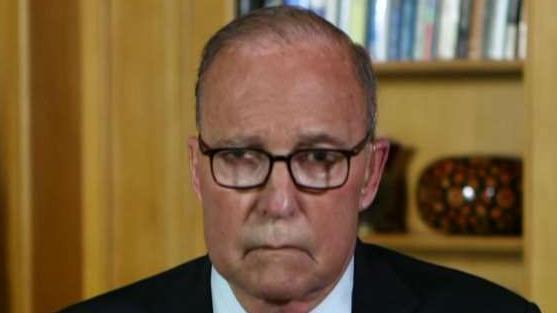Kudlow: Huawei sales to US won't imperil national security
WASHINGTON – White House economic adviser Larry Kudlow insisted Sunday that President Donald Trump won't back off national security concerns after agreeing to allow U.S. companies to sell some components to Chinese telecommunications giant Huawei.
"I appreciate their national security concerns and the president shares that point of view. This is not a general amnesty if you will. Huawei will remain on the so-called entity’s list, where there are serious export controls and in any national security instances or suggestions there won’t be any licenses but having said that I think that all that’s going to happen is the Commerce department will grant some temporary additional licenses where there’s a general availability" Kudlow told "Fox News Sunday."
Huawei will remain on an American blacklist as a potential security threat.
Trump made the announcement Saturday after meeting with China's Xi Jinping at the Group of 20 summit in Japan. Trump said U.S. companies could make the sales if the transactions don't present a "great, national emergency problem."
Several Republican senators immediately expressed concerns. In a tweet Saturday, Sen. Marco Rubio of Florida called the decision a "catastrophic mistake" adding that he will use legislation to overide Trump's deal.
Sen. Lindsey Graham, R-S.C., told CBS that Trump's agreement was "clearly a concession," and also said it would be a mistake if sales to Huawei involved "major technology."
Sen. John Barrasso, R-Wyo., described the Chinese company as a clear threat to U.S. national security. "To me, Huawei in the United States would be like a Trojan horse ready to steal more information from us," he told NBC's "Meet the Press."
American officials accuse Huawei of facilitating Chinese spying, a charge the company denies, and see it as a growing competitive threat to U.S. technology industries.
Ahead of the historic G20 outcome, Huawei's U.S. Secuirty Chief Andy Purdy told FOX Business there’s no direct link between the Chinese government and the telecom giant and welcomed the U.S. to investigate the company.
“Secondly, we do not want and we do not speak for the Chinese government and they don’t speak for us,” he said. “We still welcome the opportunity to talk directly with us government to work out these proven risk mitigation measures" he said during an interview with Maria Bartiromo.
Huawei's founder, Ren Zhengfei, said earlier this month it has cut its project sales by $30 billion over the next two years due to curbs on access to American chips and other components. He said smartphone sales outside China will fall 40%.
Huawei's U.S. sales of network gear evaporated after a U.S. congressional panel labeled the company a security threat in 2012 and told phone carriers to avoid it. The Chinese company still has a patent portfolio it licenses to manufacturers and carriers.
The Associated Press contributed to this report.




















